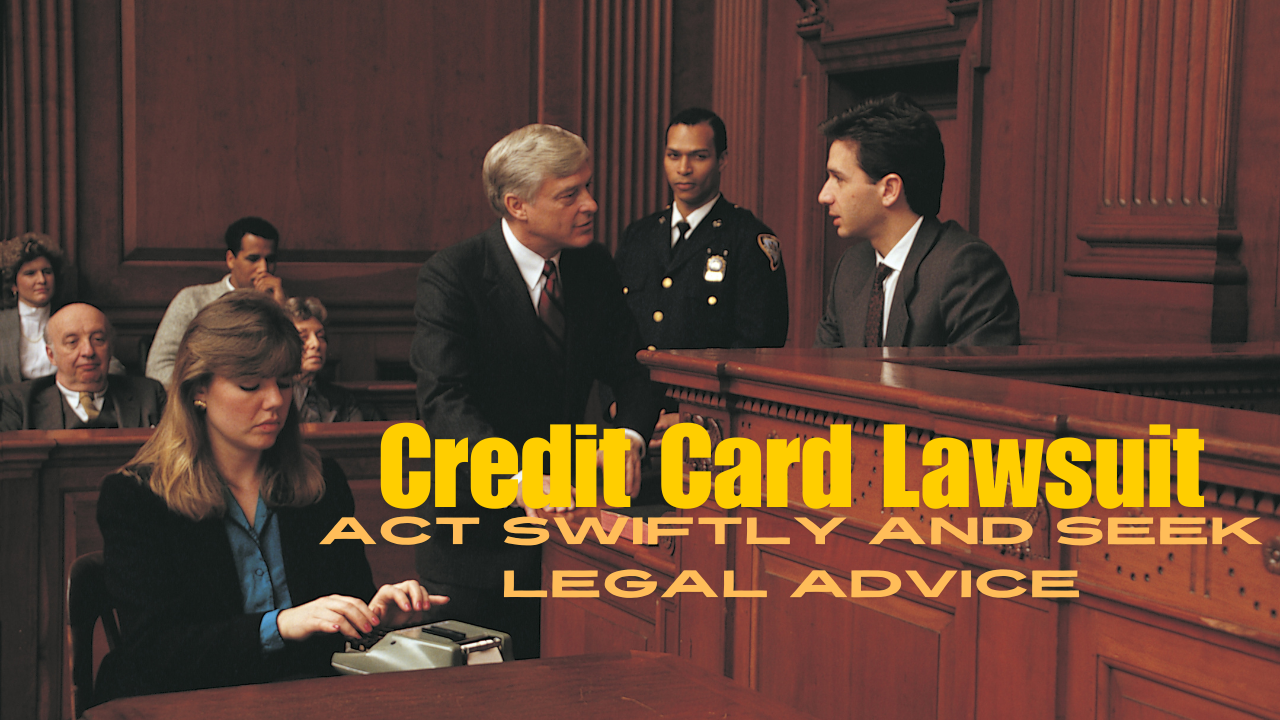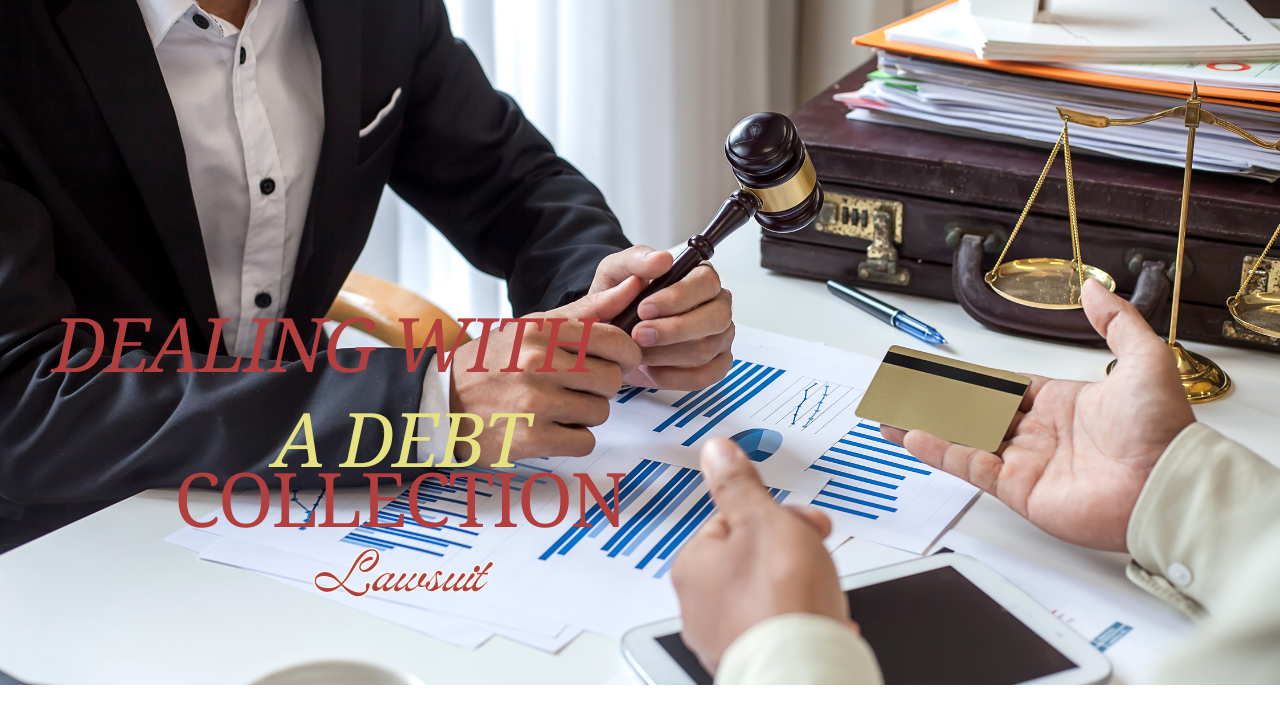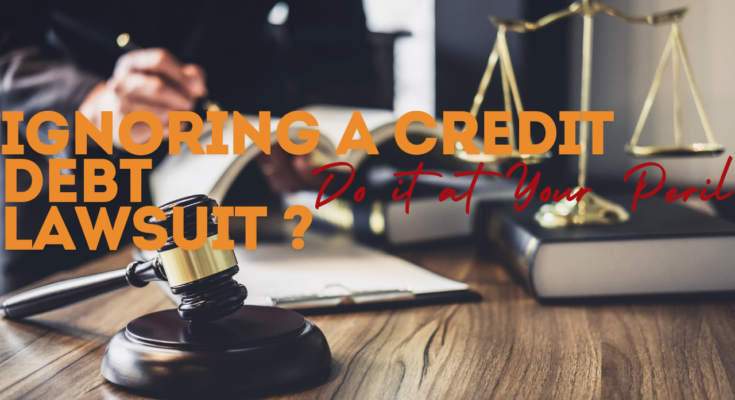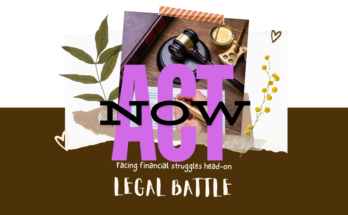If you’re facing a lawsuit over credit card debt, prompt action is essential. This guide aims to assist you in navigating a credit card debt lawsuit, including reviewing the lawsuit, identifying defenses, and discussing debt settlement. The information in this article is derived from various qualified sources on the subject. Please note that this information does not constitute legal advice, and you should consult a qualified attorney for legal counsel.

Key Takeaways
- Understand the consequences of ignoring a credit card debt lawsuit and the importance of taking immediate action.
- Carefully review the lawsuit documents to identify the allegations and the creditor’s claims.
- Respond to the lawsuit within the specified time frame, either by admitting or denying the allegations.
- Explore potential defenses, such as the statute of limitations or lack of proper documentation.
- Consider negotiating a settlement with the creditor to resolve the debt.
Understanding the Gravity of a Credit Card Debt Lawsuit
Being sued for credit card debt is a serious legal issue that needs quick action. If a creditor takes you to court for unpaid balances, the outcome can be severe if you don’t act right. A lawsuit over credit card debt is not something to ignore, as it can greatly affect your finances.
Consequences of Ignoring a Debt Lawsuit
Ignoring a credit card debt lawsuit can lead to a default judgment. If you don’t answer the lawsuit on time, the court might side with the creditor by default. This could result in your wages being garnished or money taken from your bank accounts.
Also, a default judgment can badly hurt your credit score. This makes getting loans, renting an apartment, or finding a job harder in the future. The damage to your credit can last for a long time, adding to your financial troubles.
Importance of Taking Prompt Action
When you face a credit card debt lawsuit, acting quickly is key. Ignoring it will only make things worse. By responding on time and looking at your options, you might avoid a default judgment and protect your rights.
Dealing with a debt collection lawsuit shows the court you’re serious and ready to go through the legal process. This could lead to negotiating a settlement, questioning the debt’s validity, or finding other ways to defend yourself.
Remember, being sued for credit card debt is a big deal, but it’s not hopeless. By understanding the situation and acting fast, you can protect your rights and maybe find a good outcome.

Reviewing the Lawsuit Documents Carefully
When you face a credit card debt lawsuit, the first step is to carefully review the lawsuit documents. This means looking at the complaint from the creditor and any extra papers they have. It’s key to know what the lawsuit says to plan how to defend yourself.
The complaint will tell you what the creditor says you owe, when you allegedly owed it, and why they’re suing. Make sure to check this info for mistakes or things that don’t add up.
- Look at the complaint to see what the creditor claims you did wrong.
- Check any extra papers, like credit card statements or collection notices, to see if the debt is really yours.
- See if the creditor did everything right when they served you with the lawsuit.
- Look for any defenses you might have, like the debt is too old or there’s no proof.
Looking over the lawsuit papers is the first step in making a good plan for dealing with a credit card debt lawsuit. It helps you understand what the creditor is saying and lets you make a strategy.
| Key Information to Gather | Potential Defenses |
|---|---|
|
|
By thoroughly reviewing the lawsuit documents, you set the stage for strong legal help for credit card debt. This can boost your chances of getting a good result in court.
Responding to the Lawsuit Within the Specified Time Frame
If you’re facing a credit card debt lawsuit, you must act fast, usually within 20-30 days. Ignoring it can result in a default judgment, making things harder to fix. It’s important to act quickly to protect your rights and look into your responding to the debt lawsuit or debt lawsuit defense options.
Options for Responding: Admitting or Denying the Allegations
When dealing with a lawsuit, you can either admit or deny the claims. Admitting might seem easy, but think about the consequences. It means you agree the creditor is right, which could lead to a judgment and even take money from your paycheck or assets.
Denying the claims is a different story. You might question the debt’s amount, the creditor’s right to collect, or use the statute of limitations as a defense. This approach gives you time to strengthen your case and maybe negotiate a better deal.
Seeking Legal Assistance for Guidance
Dealing with a credit card debt lawsuit can be tough, especially if you’re new to legal matters. Getting legal help for credit card debt or credit card debt legal advice from a skilled lawyer is a big help. They can look over the lawsuit, tell you about your rights, and help craft a strong debt lawsuit defense plan.
Remember, it’s key to respond to a credit card debt lawsuit on time. Knowing your options and getting expert advice can help you protect your finances and find the best outcome.
Credit card debts, lawsuit, defense
When you face a credit card debt lawsuit, it’s key to understand the legal details and what could happen. These debts can lead to legal fights. Knowing how to defend yourself can greatly affect the result.
Credit card debt lawsuits happen when you don’t pay on time and the company or collector takes legal steps. Reasons can include not paying the minimum or claims of fraud. It’s important to be well-prepared and strategic in these situations.
Establishing a Robust Defense
Defending against a lawsuit needs a detailed plan. First, look over the lawsuit papers to grasp the creditor’s claims and possible reasons for the lawsuit. This helps figure out the best defense.
One important thing in defending is the statute of limitations. This is a time limit set by law in your state for filing a lawsuit. If the lawsuit is filed too late, it might get thrown out.
The creditor must also have the right documents, like the original agreement and billing statements, to prove the debt. Without these, or if they’re not complete, the creditor’s case could be weaker.
Seeking Professional Assistance
Handling a credit card debt lawsuit can be tough. Getting help from a skilled lawyer is very helpful. They can look at your case, suggest the best steps, and speak for you in court if needed. They might also help negotiate a settlement with the creditor.
Understanding your rights and looking into possible defenses is key to dealing with a credit card debt lawsuit. With a strategic approach and legal help when needed, you can improve your chances of a good outcome and protect your finances.
| Common Defenses Against Credit Card Debt Lawsuits | Description |
|---|---|
| Statute of Limitations | The creditor may be barred from filing a lawsuit if the debt is beyond the applicable time limit set by state laws. |
| Lack of Documentation | The creditor must provide proper documentation, such as the original credit card agreement and billing statements, to substantiate the debt. |
| Inaccurate Debt Amount | The creditor’s claimed debt amount may be inflated due to interest, fees, or other charges that are not properly documented. |
| Unauthorized Charges | The debtor may be able to argue that some of the charged amounts were unauthorized or fraudulent. |
Exploring Potential Defenses
When facing a credit card debt lawsuit, it’s key to look into legal defenses that can help your case. Two main defenses to think about are the statute of limitations and the lack of proper documents.
Statute of Limitations Defense
The statute of limitations sets a time limit for creditors to sue you for unpaid debt. This time varies by state, usually between 3 to 6 years for credit card debt. If the creditor tries to sue you for debt that’s too old, you might argue the lawsuit is too late and should be thrown out.
Lack of Proper Documentation Defense
Creditors must have enough evidence to back up their claims. This includes things like the original credit card agreement, billing statements, and payment records. If they can’t show these documents, you could argue they don’t have enough proof of the debt. This might lead to the lawsuit being dismissed.
Looking into these and other defenses is a key step in protecting your rights and possibly solving a credit card debt legal advice lawsuit. It’s vital to carefully check the lawsuit papers and get legal help for credit card debt to know your options and build a strong defense.
Negotiating a Settlement with the Creditor
If you’re facing a credit card debt lawsuit, think about negotiating a settlement with the creditor. Negotiating might seem tough, but it could help you pay less and avoid a court judgment.
The credit card debt settlement process means talking directly with the creditor to agree on the debt. You might offer a lump-sum payment or a payment plan with smaller monthly payments. This way, you could handle the credit card debt lawsuit better and avoid a judgment’s long-term effects.
Getting legal help for credit card debt is a smart move. An experienced lawyer can guide you, explain your rights, and negotiate for you. They make sure the settlement is fair and can be enforced.
Be ready with your financial info when negotiating. Include your income, expenses, and any reasons why you can’t pay the full amount. This shows you’re serious about settling and explains why it’s good for the creditor too.
Creditors might prefer a settlement over a long, expensive court battle. Being professional and cooperative can help you both agree on a settlement.
In summary, if you’re dealing with a credit card debt lawsuit, negotiating a settlement with the creditor is worth considering. With the right strategy and legal advice, you could settle the debt on better terms. Taking action can help you manage the situation and aim for a positive outcome.
Preparing for Court If Necessary
If you’re facing a credit card debt lawsuit, getting ready is key. You need to collect evidence and documents to defend yourself. You also need to decide if you’ll represent yourself or hire a lawyer.
Gathering Evidence and Documentation
It’s vital to collect all the documents that support your case. This includes:
- Copies of your credit card statements and payment history
- Any letters or emails you exchanged with the creditor
- Proof of identity theft or unauthorized charges, if applicable
- Documents showing the statute of limitations has expired on the debt
- Evidence of any errors or inaccuracies in the creditor’s claims
Having these documents in order is crucial for your debt lawsuit defense.
Representing Yourself or Hiring an Attorney
Deciding whether to represent yourself or hire an legal help for credit card debt is important. Representing yourself can save money but requires understanding the legal process. Hiring a lawyer offers expertise but is more expensive.
If you choose to hire a lawyer, find one experienced in handling credit card debt lawsuit. They can guide you, negotiate with the creditor, and protect your rights.
Post-Judgment Options and Potential Consequences
If you’ve been sued for credit card debt and a judgment is entered against you, it’s crucial to understand the potential consequences and explore your options. The aftermath of a credit card debt lawsuit can have far-reaching impacts on your financial well-being. It can affect your credit score and garnish your wages.
A judgment can stay on your credit history for up to seven years. This makes it hard to get new credit, secure a loan, or even rent an apartment. It can have a lasting impact on your financial opportunities.
The creditor may also try to collect the debt by garnishing your wages or seizing your assets. This could be your bank account or personal property. This can make your financial struggles worse and make it harder to get back on track financially.
Exploring Your Options
Even with a credit card debt lawsuit judgment, there are steps you can take to address the situation. Some options include:
- Appealing the Judgment: If you think the court made a mistake, you might be able to appeal the judgment. This process is complex and may require legal help.
- Negotiating a Payment Plan: You can try to work out a payment plan with the creditor. This might let you pay off the debt in smaller installments instead of all at once.
- Seeking Bankruptcy Protection: In some cases, filing for bankruptcy could be an option to discharge the debt and start fresh. But, this should be carefully considered with advice from a qualified bankruptcy attorney.
The consequences of a credit card debt lawsuit judgment can be severe. But, with the right approach and help, you can protect your financial well-being. You can also explore solutions to address the situation.
| Potential Consequences | Mitigation Strategies |
|---|---|
| Damage to credit score | Appeal the judgment, negotiate a payment plan |
| Wage garnishment | Negotiate a payment plan, consider bankruptcy |
| Asset seizure | Negotiate a payment plan, consider bankruptcy |
By understanding the potential consequences and exploring your options, you can take proactive steps. You can protect your financial well-being and address the credit card debt lawsuit judgment effectively.
Conclusion
If you’re facing a credit card debt lawsuit, it’s important to act fast to protect your money. Knowing the seriousness of the situation helps you make smart choices and look at all your options.
You might decide to accept or deny the lawsuit claims, or get legal help to navigate it. Acting quickly and with purpose is crucial. Using defenses like the statute of limitations or missing documents can help your case.
Dealing with a credit card debt lawsuit means knowing your rights, talking with creditors, and possibly going to court. By doing these important steps, you can protect your financial future. You’ll come out of this stronger and more confident.
FAQ
What should I do if I’m sued for credit card debt?
If you’re sued for credit card debt, act fast. Read the lawsuit papers well, answer on time, and think about getting legal help. This will help you know your rights and how to defend yourself.
What are the consequences of ignoring a credit card debt lawsuit?
Ignoring a credit card debt lawsuit can cause serious problems. You could lose your wages, have your bank account taken over, and hurt your credit score. It’s important to take this seriously and act right.
How do I respond to a credit card debt lawsuit?
To answer a credit card debt lawsuit, you can either agree or disagree with the claims. It’s wise to get legal advice to make a smart choice and meet the deadline.
What potential defenses can I use against a credit card debt lawsuit?
You might use defenses like the statute of limitations (if the debt is too old) or lack of proof (if the creditor can’t show the debt exists).
Can I negotiate a settlement with the creditor?
Yes, settling with the creditor is an option. It might help you avoid a judgment and lower what you owe. Getting legal advice is a good idea for a successful negotiation.
What should I do if I have to go to court for the credit card debt lawsuit?
If the lawsuit goes to court, collect all important evidence and documents for your defense. You can represent yourself or hire a lawyer to speak for you in court.
What are the potential consequences if a judgment is entered against me?
Getting a judgment against you can badly affect your credit, income, and assets. You might need to appeal the judgment or set up a payment plan to deal with the fallout.
Disclaimer:
The topics discussed in this blog are for educational and informational purposes only. They do not constitute formal advice to act upon in any way. Readers should consult with a qualified professional before making any decisions or taking any actions based on the information provided. The author and the blog are not liable for any consequences resulting from the use or reliance on the information presented.




